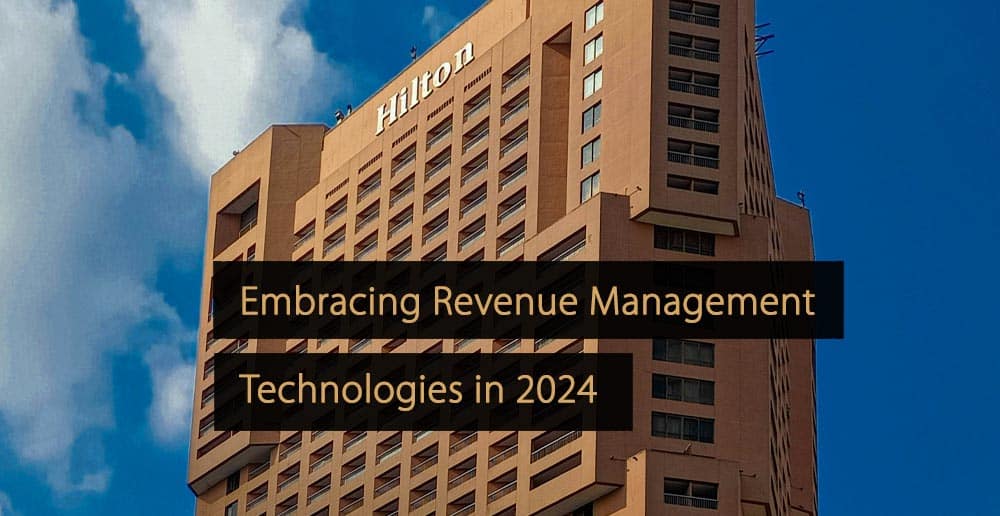Revenue Management Trends
Revenue Management trends refer to the evolving strategies and technologies used in optimizing income and profit in various industries, especially hospitality. These trends are critical as they involve adapting to market changes, utilizing data analytics for informed decision-making, and embracing digital transformation. They enable businesses to forecast demand, set dynamic pricing, and manage inventory efficiently. Staying current with these trends is essential for maximizing revenue and maintaining a competitive edge in an increasingly data-driven and dynamic market environment.
Key Takeaways
- Total Revenue Management: Focus on maximizing all revenue streams.
- Advanced Technology: Importance of revenue management software and tools.
- Cross-Departmental Collaboration: Essential for effective revenue management.
- Personalized Pricing: Tailoring prices to customer segments.
- Artificial Intelligence: Increasing use in forecasting and optimization.
- Data Transparency: Sharing data across departments for informed strategies.
- Dynamic Pricing Models: Adaptation to real-time market changes.
- Focus on Guest Value: Prioritizing long-term customer value.
- Holistic Market Approach: Considering broader market factors in strategies.
Table of Contents:
- Understanding the Basics of Revenue Management
- Keep Up to Date With the Latest Revenue Management Trends
- 9 Revenue Management Trends to Stay Ahead of the Game
- 1. Omnichannel Data in Hotel Revenue Management
- 2. Using Artificial Intelligence in Revenue Management
- 3. Ancillary Revenue Management Pricing
- 4. Total Revenue Management
- 5. Hotel Technology
- 6. Cross-Departmental Collaboration
- 7. Data, Data, and More Data
- 8. Forward-Looking Market Demand
- 9. Data Visualization
- More Revenue Management Strategies
- More Revenue Management Tips
- Hotel Marketing Trends
- The Most Important Hotel Software Solutions
Introduction
A significant part of getting the most out of a hotel revenue management strategy involves keeping up with the latest revenue management trends and implementing associated strategies while investing in relevant technology. In this article, you can learn all about the latest developments in this area to stay ahead of the game.
Understanding the Basics of Revenue Management
Before getting into some of the specific revenue management trends you should be aware of, it is important to understand what revenue management is. Essentially, it is the practice of selling the best product to the best person at the best time for the best price using the best channel to maximize financial results.
Check out the “Revenue Management; clearly explained!” article for a much more comprehensive explanation of revenue management, the history of revenue management, why it is so valuable, how it differs from the similar concept of yield management, and the main key performance indicators (KPIs) that are used to track performance.
Keep Up to Date With the Latest Revenue Management Trends
Revenue management is vital for those in the hotel industry hoping to maximize financial results. It is a process that uses data and other information to anticipate demand to optimize pricing, distribution, and marketing. However, keeping up with the latest revenue management trends is crucial too.
After all, consumer behavior is changing all the time, and new technology emerges and becomes more important. Moreover, the distribution landscape is constantly developing, and new strategies are always being tested. By keeping up to date, you can get the most out of your business and stay ahead of your rivals.
9 Revenue Management Trends to Stay Ahead of the Game
In this section, you can learn about six of the main revenue management trends you need to be aware of. As a revenue manager or business leader in the travel and tourism industry, understanding these trends and adopting the associated strategies can help to give you a competitive edge.
1. Omnichannel Data in Hotel Revenue Management
Among the key revenue management trends has been a greater focus on omnichannel data and effective analysis of that data. Essentially, omnichannel data refers to data gathered from all customer interactions across all channels. Crucially, this data is viewed holistically rather than keeping it separated according to those channels.
When viewed as a whole, this data can provide useful insights to assist with revenue management. For instance, it might help uncover some of the sticking points in the customer journey or some of the common customer issues. Addressing these problems can then boost revenue generation and overall financial results.
Table: Key Aspects of Omnichannel Use in Hotel Revenue Management
2. Using Artificial Intelligence in Revenue Management
The use of artificial intelligence technology is another major revenue management trend hotels need to be aware of. AI can be extremely valuable in this area because gathering and analyzing data is crucial to revenue management. AI is able to analyze data and extract insights far quicker than humans can.
AI can also allow many of the key revenue management activities to be fully or partially automated. For instance, AI could analyze trends within data and determine that the most effective course of action would be to reduce room rates. AI could also be configured to carry out this adjustment at the ideal time automatically.
Video: Revolutionizing Hotel Revenue Management with AI and Machine Learning
3. Ancillary Revenue Management Pricing
Ancillary revenue management refers to revenue management related to additional hotel services beyond selling hotel rooms. There are many different examples of ancillary services, including on-site food services, on-site drinks services, leisure services, spa services, tours, event hosting, a gift shop, or even food deliveries.
For hotels, ancillary services provide an opportunity to maximize revenue, and optimizing these extra revenue streams has become one of the biggest revenue management trends. There is still a strong strategic element, such as setting extra services at the right price, adjusting prices based on demand, and promoting these services effectively.
4. Total Revenue Management
Among the most significant revenue management trends to be aware of is the concept of total revenue management. Within hotels, revenue management is usually focused on pricing, distribution, and marketing of hotel rooms. Yet, with total revenue management, the focus turns to generating as much money as possible from all revenue streams.
In truth, the concept of total revenue management is nothing new. Still, a combination of factors, including technological limitations and a lack of understanding within the industry, meant that the focus was often more narrow in the past. However, hotels can greatly boost their results by adopting a total revenue management approach.
Video: Total Hotel Revenue Management
5. Hotel Technology
New and emerging technology will always be one of the most critical revenue management trends to keep pace with. Some of the biggest technology trends include the use of hotel management software, the rise of specialist revenue management software, and other tools, like upselling software. According to the Revenue Management System Market Report by The Insight Partners, the global revenue management system market is projected to grow to $37,106.75 million by 2028.
Meanwhile, business intelligence software is increasingly used to facilitate and support data-based business decision-making. Of course, the nature of hotel technology is that it constantly evolves, so it is essential always to remain aware of new developments and be willing to adopt new approaches.
For more information about hotel technology, read “Hotel Technology Trends: Upcoming Innovations You Must Know.”
6. Cross-Departmental Collaboration
Another key revenue management trend to be aware of is the heightened need for cross-departmental collaboration. This has always been a major part of effective revenue management because different departments must collaborate to share relevant data and ensure their strategies align with broader business objectives.
However, collaboration has become even more critical in light of the rise of total revenue management. For instance, not only should a hotel look to upsell and cross-sell on a broad level, such as including restaurant bookings within sales, but each department should also upsell and cross-sell, such as selling larger meals or extras, like wine, dessert, etc. Revenue management forecasts can also assist housekeeping, restaurant, and kitchen staff with planning.
7. Data, Data, and More Data
Data is at the heart of any good revenue management strategy, and the array of data available to hotels is vast, including historical data, current trends, competition data, wider market data, online reviews, data in the books, and more. This requires careful use of data analytics to achieve the best outcomes.
Analysis of the data needs to be carried out in a structured way, and the data needs to be interpreted so that it can be used to inform decisions. From there, strategies can be adjusted based on what data tells you about the present market situation, future demand, and other needs, leading to better decisions and business outcomes.
8. Forward-Looking Market Demand
Historically, revenue management has relied on past data to anticipate future demand. However, one of the major revenue management trends you need to know about is the rise of forward-looking market demand data. This refers to clear data regarding future demand levels, typically from competitors.
Those involved with hotel management can access data on the books for rival hotels and other forms of data that can be used to gain a much clearer sense of what demand will look like in the future. It becomes much easier to make firm plans for strategically responding using that information.


9. Data Visualization
To reach peak performance, it is essential that you continuously monitor and understand business performance. What are your main revenue streams? What is the revenue per distribution channel? What costs are associated with each distribution channel? What is the current book’s performance per hotel, room type, segment, restaurant, and bar?
With so much information to monitor, and with some of this information changing constantly, visualization can be a crucial tool for understanding your entire business. It can assist with identifying important changes, noticing revenue management trends, and giving yourself the best possible chance of reacting quickly to opportunities and risks. As a bonus, visualization can also help you to present information to different departments, making collaboration easier.
More Revenue Management Strategies
Aside from keeping up with the latest revenue management trends in a general sense, it is also crucial that you adopt the most up-to-date revenue management strategies. From segmentation and price optimization to embracing SEO and offering incentives for direct bookings, these strategies should be intended to maximize revenue and profit.
Check out “Revenue Management Strategies to Grow Your Hotel Business” to find a complete breakdown of some of the most important strategies to adopt in this area and explain how they can assist with growth.
More Revenue Management Tips
Along with these general and strategic revenue management trends, it can also be valuable for a revenue manager to access broader revenue management tips. For instance, has your business adopted a revenue management culture? Is your record-keeping consistent? Are you using automation and focusing it on the right areas?
Read the “Revenue Management Tips for Hotels” article to learn more about the best revenue management practices within hotels and why those practices are so beneficial.


Hotel Marketing Trends
It is also important to stress that revenue management trends are not the only trends hotel business leaders need to be aware of. Keeping up with the latest hotel marketing trends is also essential. It helps to maximize reach and reputation while also ensuring that other hotels do not gain an advantage in terms of exposure.
Read “Hotel Marketing; The Latest Trends in the Hotel Industry” for information on customer experience marketing, artificial intelligence, influencer marketing, user-generated content, and other hotel marketing trends.
The Most Important Hotel Software Solutions
Finally, alongside adopting the most up-to-date revenue management trends, keeping in touch with useful hotel software solutions constantly is essential. These solutions include property management systems, revenue management systems, reputation management software, and rate shopper software. According to the Global Hotel Revenue Management System Market Report by Verified Market Reports, the global hotel revenue management system market is projected to grow at a CAGR of 8.7% between 2021 and 2028.
Take a look at “Hotel Software: The Most Important Software Solutions for Hotels” for a breakdown of the main software applications that can assist a hotel revenue manager, marketing manager, or general manager.
Revenue Management Trends FAQs
Keeping pace with emerging technology and adopting strategies based on the most up-to-date revenue management trends is a major part of optimizing financial results and avoiding giving rivals a competitive advantage. The trends mentioned are among the most important now, but it is important to monitor developments as well continually.
Want to Learn More About Trends in Related Industries?
It is essential to be aware of all the upcoming trends in the hospitality & tourism-related industries. While some trends can affect multiple industries, some are specific to the industry. You can learn more about trends within different industries in the following articles.
- Hotel Trends: Discover The Latest Developments in The Hotel Industry!
- Hospitality Trends: The Latest Trends in The Hospitality Industry
- Travel Trends: Opportunities for the Travel Industry
- Tourism Trends: The Latest Opportunities for The Tourism Industry
- Restaurant Trends You Must Know As a Restaurateur








Leave A Comment